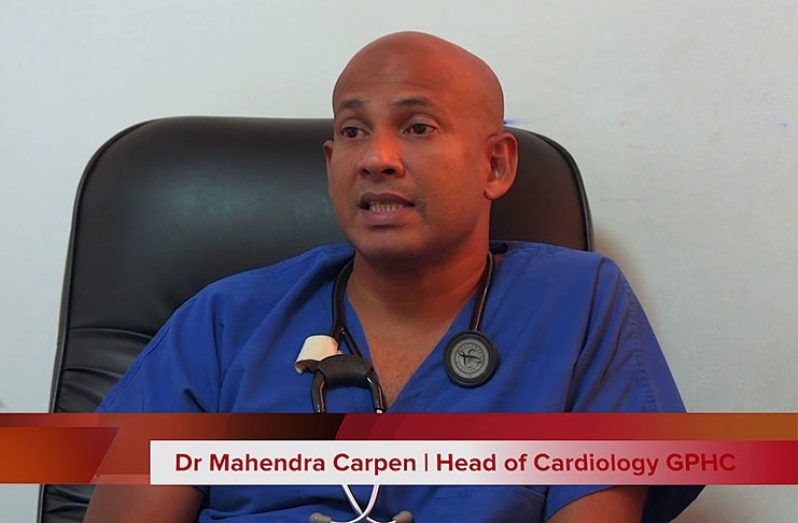-Following successful treatment of three ‘seriously ill’ patients
A MAJOR breakthrough in the fight against the Novel Coronavirus (COVID-19), in recent days, has been the success of a “convalescent plasma treatment,” something, which, because of its success in treating three “seriously ill” persons, could become permanent in the fight against the deadly disease.
A few weeks ago, four seriously ill, COVID-19 patients, of the Georgetown Public Hospital Corporation (GPHC), consented to be part of a clinical trial involving the transfusion of antibodies of a convalescent patient (recovered person) to their bodies.
It is public knowledge that there is no vaccine/cure for COVID-19, and with the success rate of the plasma treatment still undetermined here, at that time, some would say it was a bold step by those patients and even the medical professionals.
Monoclonal antibody therapy, as the treatment is called, is defined as a form of immunotherapy that uses monoclonal antibodies to bind monospecifically to certain cells or proteins. The objective is that this treatment will stimulate the patient’s immune system to attack those cells.
And, according to the World Health Organisation, since the last century, passive immunisation has been used for the prevention and treatment of some human infectious diseases. The serum of convalescent patients is the treatment of choice in cases of Argentine Hemorrhagic Fever.
In addition, WHO said it was used during outbreaks of Ebola in Africa and also during the SARS and MERS outbreaks, as no other therapeutic options existed.
“Experience to date with the use of convalescent plasma for the treatment of COVID-19 is limited, but preliminary results indicate potential usefulness. Several controlled clinical trials are underway, to collect more quality scientific evidence to confirm the safety and efficacy of this intervention,” said the international health organisation.
Guyana was fortunate enough to be selected as one of the first countries in the Caribbean to be part of the clinical trials.
And, with the participants on board, authorities commenced the treatment, which, in the end, produced a high success rate. Three of the four patients recovered in a matter of days, but one patient died, said Cardiologist, Dr. Mahendra Carpen, who is in charge of the trials.
In referring to the patient who died, Dr. Carpen told this publication: “Unfortunately that was the very first person we tested, and it was a last stage or what we call compassionate treatment, but that person did not make it.”
For those who recovered, the doctor said persons may argue that the patients would have recovered either way, but he said Guyana’s case is only a small sample size. And, if persons look at the overall results from an international perspective, they will see there is definite benefits through the plasma therapy.
Recovery is measured and determined by the reduction in symptoms, reduced requirement for support care, and the negative results from repeat testing for COVID-19.
When asked if the results are enough to determine if the treatment will be permanent, Dr. Carpen said: “It is likely that it will be permanent…we are learning a lot about the benefits from this…we know the science behind this therapeutic approach is solid and now we have decent results to back up the science.”
Recovered patients have already started to volunteer their blood for the clinical trials, but Dr. Carpen said there is no immediate need to use the treatment again in other patients. The treatment, however, once utilised, is compounded by other supportive therapeutic options.
“We have limited resources but we use what we have… the more sophisticated therapeutic options are not available here or in the Caribbean, but we are doing our best,” said the doctor.
Guyana recorded its first case of COVID-19 in March, 2020 and since then, the country has seen a consistent rise in cases, with 351 cases being recorded so far. Of those cases, 176 persons recovered and 19 persons lost their lives, but there are still 156 active cases, which are being monitored by authorities.
The disease has forced change in society, with persons now either confined to their homes or mandated to wear a mask in public, among other things.
And, while the World Health Organisation (WHO) said most people infected with the COVID-19 disease will experience mild to moderate respiratory illnesses and recover without requiring special treatment, there are older persons and those with underlying medical problems such as cardiovascular disease, diabetes, chronic respiratory disease, and cancer, who are likely to develop the serious forms of COVID-19.
The WHO believes that the best way to prevent and slow down transmission is to be well- informed about the virus, the disease it causes and how it is spread. Personal initiatives compounded by control measures instituted by authorities will increase the chances of fending off the deadly scourge.



.jpg)








